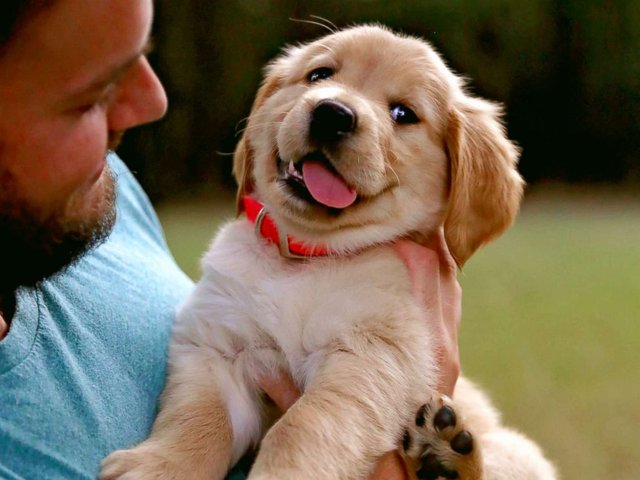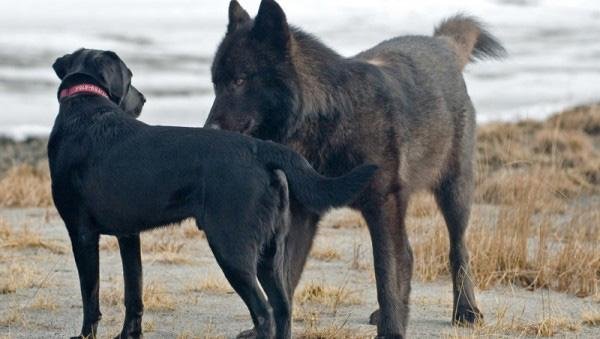Are Dogs friendly because of a mental disease?
Are you a cat or a dog person?
If you chose the second option, maybe it is because you enjoy interacting with others (which is also why you are on Steemit). Maybe you bond easily with people and they feel comfortable opening up to you. Sometimes this makes you an easy target for people who want to take advantage of you but you stay optimistic about human nature. What makes someone an trustful or wary? An easy explanation would be that social optimism results from growing up in a positive environment where one was encouraged to express themselves.
Would you be a different person if you grew up in a war-torn country, living every day in the fear of other human beings? No one knows the answer, but the question of defining what traits are innate or acquired is a sensitive topic. Explaining violent behaviors by the abuses a person went through during their childhood questions our definition of responsibility. At the same time, trying to explain certain behaviors simply by the activity of certain genes is a slippery path that could be used as a tool to justify extreme ideologies.
I am sure that my fellow Steemians writing about psychology know more than I do on this topic, so I will not take any risk here. Instead, let’s talk about something we all like: Dogs.

Feels better right? Image source
The genetics of dogs is very interesting because like most domesticated animals, their evolution was not only influenced by the need to survive and efficiently reproduce, but also the needs of their human tamers. Since the speciation event that separated them from grey wolves, dogs have been selected for different traits depending on what their owners used them for: size and trainability for hunting, aggression for dog fights, playfulness for pets, or simply because they were incredibly cute.
This is how we ended up with so many different dog races with very specific morphologies and personalities, some of them not even able to reproduce with other races anymore.

An obvious characteristic of dogs is how well they get along with humans. They understand our emotions; they learn to obey to us and seem to love us unconditionally. This sociability trait was probably intensely selected for throughout the centuries, and our ancestors who first tried to tame a wolf might have learned the hard way to choose the friendliest individuals.
Researchers recently observed that even wolves raised by humans, even though they greet their trainer when they see him, do not interact as much with humans as dogs raised in the same conditions. This suggests that there is something intrinsic that makes dog friendlier to us.
The friendliness gene?
In an article published last year, a joint team of geneticists, behaviorists and psychologists studied specific genomic regions found to be under positive selection in dogs compared to wild wolves. In this context, a positive selection means that these regions mutate on average a lot slower than surrounding DNA at the scale of a population. This often means that they are involved in important functions and that individuals with mutations in these regions are disadvantaged for reproduction.
Among the regions identified in this analysis, one was noticed to contain several variants highly enriched in dogs but not in wolves. The interesting part is that this region of the genome is known to be associated with a disease in humans: the Williams-Beuren syndrome which causes, among other symptoms, a delayed cognitive development, behavioral abnormalities and an hyper-sociability.
By now you might already guess where this is going: dogs show mutations in a region associated with hypersocial behaviors in humans, which could explain the way the interact with us. While we see here the power of association studies to understand complex genetic traits, we should be careful with these interpretations. The Williams-Beuren syndrome in humans is caused by a deletion of 28 genes, which is a lot, and we have no indications that these genes have the same function or interact the same way in dogs. Furthermore, the biology of behavioral development is incredibly complex and cannot be explained by simple cross-species analogies. Finally, the mutations observed in dogs are not the same as those seen in humans suffering from the Williams-Beuren syndrome. However, the fact that this region seems to be under selective pressure and consistently different between dogs and wolves is probably a good start for further studies.

Friendliness is not social intelligence
The most interesting part of this study in my opinion, is that it suggests that the traits that we like the most in dogs, and that we used as a selection criteria for centuries, may be due to the same kind of mutations that lead to what we consider as a disease in our own species.
Contrary to what we may think instinctively, dogs have not evolved to become more ‘socially intelligent’ to interact with us, they actually show signs of Neoteny, which means that adult dogs show traits normally limited to juvenile individuals. In this case, these traits are exacerbated attachment and a constant need for social interaction that is not present in adult wolves.
While this conclusion is simultaneously fascinating and frightening, the facts are here: after centuries of efforts we managed to create ourselves a best friend for life.
Sources and further reading
- I encourage you to read the original publication of this studies:
- A review article giving keys to understand the genetic evolution of domestic dogs:
- A simplified press review of the study
- Learn more about neoteny

this is a interesting subject and very good writing! Im a dog person and I havn't known that they have the same gene-deletion. But I think that shows how similar they are to humans altough it's not clearly if the effects of this deletion are the same...
True, but it's also very interesting to see how genetic similarities could have completely different effects and implications from one species to another :)
Hahaha I always say something similar to my sister, she has a papillon that lives with us. That the friendliness seems like a sort of mental disability, which humans love . If we can be grouchy to someone and them forget it and love us again an hour later, what a treat!
@originalworks
I actually often had similar thoughts to this effect! Dogs just look so silly-happy oftentimes that they kinda look 'challenged', or stuck in a nonage stage, their behavior being very similar to what in nature is restricted to pups.
Pity so few took notice of this, it's a good short article and an interesting topic. Full vote from me!
Thanks for support, i'm glad you liked it!
Totally agree, their emotional dependance is even more obvious when you compare it to the interactions in a wolf pack. I would not have imagined that there was such a clear genetic pattern though.